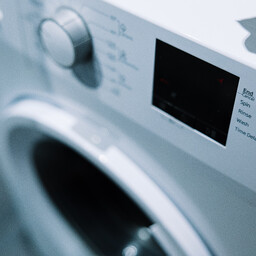Alates 2026. aasta septembrist ei tohi Eestis müüa seadmeid, mis
sunnivad tarbijaid vahetama veel toimivaid osi välja uute vastu
.
sunnivad tarbijaid vahetama veel toimivaid osi välja uute vastu
Tõlge fraasile: sunnivad tarbijaid vahetama veel toimivaid osi välja uute vastu
EN
force consumers to replace still functional parts with new ones
Näiteks ei tohi printer olla seadistatud nii, et see
keeldub töötamast
, kui
tindikassett ei ole veel täielikult tühi
. See on mõeldud selleks, et tarbijad ei peaks ostma uut tindikassetti, kui vanas on veel tinti sees.
keeldub töötamast
Tõlge fraasile: keeldub töötamast
EN
refuses to work
tindikassett ei ole veel täielikult tühi
Tõlge fraasile: tindikassett ei ole veel täielikult tühi
EN
ink cartridge is not yet completely empty
Samuti ei tohi tootjad väita, et nende seadmed töötavad pikalt, kui tegelikkuses need
riknevad varem
. Näiteks ei tohi pesumasina tootja öelda, et masin töötab tuhat pesutsüklit, kui see rikneb varem.
riknevad varem
Tõlge fraasile: riknevad varem
EN
break down earlier
Uus seadus keelab ka
seadmete kavandamist nii, et nende eluiga lüheneb
. Näiteks ei tohi pesumasin peatuda lihtsalt sellepärast, et see on seadistatud seisma pärast teatud arvu pesutsükleid, kuigi
masin on veel töökorras
.
seadmete kavandamist nii, et nende eluiga lüheneb
Tõlge fraasile: seadmete kavandamist nii, et nende eluiga lüheneb
EN
designing devices so that their lifespan is shortened
masin on veel töökorras
Tõlge fraasile: masin on veel töökorras
EN
the machine is still in working order
Samuti ei tohi seadmeid reklaamida
parandatavana
, kui nende jaoks pole
varuosi saadaval
.
parandatavana
Tõlge fraasile: parandatavana
EN
as repairable
varuosi saadaval
Tõlge fraasile: varuosi saadaval
EN
spare parts available
Uus seadus muudab ka
keskkonnaväidete kasutamist
toodete reklaamimisel. Näiteks tohib reklaamis kasutada sõnu nagu "ökoloogiline" või "loodussõbralik" ainult siis,
kui need on tõestatud
.
keskkonnaväidete kasutamist
Tõlge fraasile: keskkonnaväidete kasutamist
EN
use of environmental claims
kui need on tõestatud
Tõlge fraasile: kui need on tõestatud
EN
if they are proven
Seaduse rikkumise korral võib ettevõte saada
trahvi kuni nelja protsenti aastakäibest
või kuni kaks miljonit eurot.
trahvi kuni nelja protsenti aastakäibest
Tõlge fraasile: trahvi kuni nelja protsenti aastakäibest
EN
a fine of up to four percent of annual turnover
Starting from September 2026, devices that force consumers to replace still-functional parts with new ones cannot be sold in Estonia.
For example, a printer must not be configured to refuse to work if the ink cartridge is not yet completely empty. This is intended to ensure that consumers do not have to buy a new ink cartridge when there is still ink left in the old one.
Manufacturers also cannot claim that their devices last long if they actually break down earlier. For example, a washing machine manufacturer cannot say that the machine works for a thousand wash cycles if it breaks down sooner.
The new law also prohibits designing devices in a way that shortens their lifespan. For example, a washing machine must not stop simply because it is programmed to halt after a certain number of wash cycles, even if the machine is still in working condition.
Devices also cannot be advertised as repairable if spare parts are not available for them.
The new law also changes the use of environmental claims in product advertising. For example, terms like "ecological" or "environmentally friendly" can only be used in advertising if they are proven.
Violations of the law may result in fines of up to four percent of annual turnover or up to two million euros.

